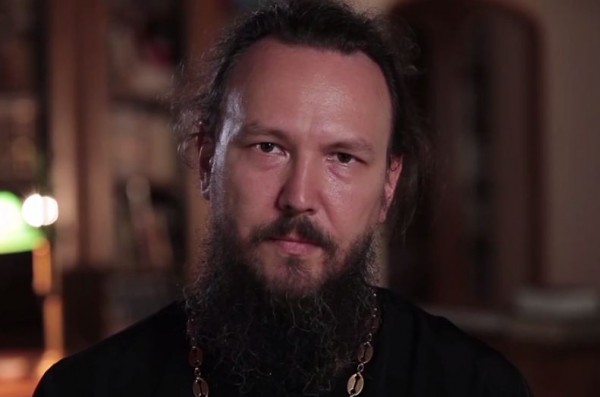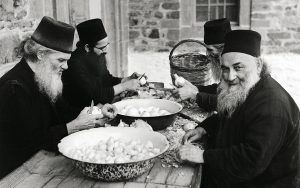I hope it is not too bold to suppose that the most dangerous mistake that can be made by a person when preparing for the endeavour of Great Lent is to look for guarantees of spiritual success. For us this is natural: who would want to “invest” without guarantees, without “investment insurance”? And really – why not arrive at Easter with your soul scrubbed white and simply and directly say to Christ: “Lord! Look at me, I am ready, come to me. You saw that I fasted, prayed, suffered, I have done everything on my part, I am quite ready for Your Glorious Resurrection!” And if you really simplify it, it might sound something like: “Lord! What about our spiritual dividends?” And as soon as a person begins fasting with such thoughts, he thus destroys that very spiritual fruit that should result from undergoing this spiritual exercise in a full and correct manner.
It is with good reason that the Holy Church has caused the journey of Great Lent to be preceded by preparatory weeks, supposing that an attentive Christian will give some thought as to why he should not pray like the Pharisee, and why he should not see himself in the Church as the elder brother, who looks with contempt and surprise at how the younger son, an adulterer and a squanderer, returns to his father, who then greets him with open arms.
The week dedicated to the Last Judgement completely clarifies all the points. After all, this Gospel reading does not speak about who fasted and who did not, who prayed and who did not, but the state in which a person comes to the Last Judgement. And this state, as a rule, is starkly different to the way that the person views himself.
What shocks me the most in this reading is the sincerity with which the sinners are perplexed at the reason for which they are sent to hell. If only they had been told in advance, they would have made all the proper arrangements! But what brings an immeasurably greater shock is the same sincerity in the surprise of the righteous at finding themselves among those that are saved. After all, the reason for which they are chosen to be with Christ in the Kingdom of Heaven was for them never an end in itself. All of it – to feed, to quench thirst, to comfort – was for them something that was matter-of-course; they could not think in any other way nor understand how one could act differently in such situations.
With these harsh parables, which sound like nails scraping over glass in the benign atmosphere of places of worship, the Church knocks from under our feet the false supports that we constantly try to create for ourselves, so that our fast progresses successfully and beneficially – from our point of view.
We can fast all we like, pray as diligently as we like, subject ourselves to all kinds of struggles, but in the end, when we have fasted ourselves to exhaustion, exacerbation and incomprehension as to who thought all of this up and why, we suddenly find ourselves in the only right state, in which it is impossible not to lift up your eyes to God and say: “Lord, this is how I am, don’t expect anything else from me. Everything else depends on You.”
And this, strictly speaking, is the actual point of fasting: to cut off the false guarantees of our closeness to God, our “propriety” and even “exclusiveness”, which we ourselves have dreamed up, to turn our souls inside-out, showing everything as it is in reality. And, of course, to show not to God, Who already knows all about us, but to ourselves.
In this state, in some ways close to despair, a person stands before the face of God already without any demands of any kind of help or expectation of the coming of some sort of grace. And so, when the person steps over the threshold of Great Lent and enters the Paschal feast, naturally, he does not ask: “Lord, what is this? Where is the promised grace? I fasted so thoroughly, I prayed so much, I put myself through so many trials, but I do not feel any of that Paschal joy!” On the contrary, he will say: “It’s good that I am not trying to fake the Paschal joy, which so far is, unfortunately, absent. How good it is that all my labours have shown that I should be thankful to God simply for the fact that I am on this earth, that I am more or less healthy and that I am able to do something.”
The opposite state of the soul automatically rules out, or rather, blocks the very joy of Christ’s Resurrection that comes from above, which by our own efforts we cannot artificially recreate within ourselves.
I do not remember who it was exactly, but when reading the Fathers I came across the thought that the Resurrection of Christ is like a sacrament that takes place within the Church, within the souls of the people that form part of this body. This is a truly wonderful moment where human preparationand God’s mercy meet. But how and when this meeting takes place naturally depends above all on God.
Why does St. John Chrysostom, in his sermon that is read at each Easter service, utter the words that sound strange from the point of view of piety: Come, both those who fasted and those who did not fast, those who have shown abstinence and those who were slothful? By this he seems to completely remove the foundation of the whole church canon, which demands that a person should keep Great Lent thoroughly and with all attentiveness.
In actual fact there is no contradiction here. Yes, the human part is very important. Yes, if we do not do it for some reason, we thus show that we have a strange kind of attitude towards God. But it is not the measure of our fast that determines whether Christ will come to a person’s soul or not.
We know that there are cases when a person who never fasted or who never went to church in his life suddenly finds himself inside the environment of a Paschal service, this dancing, exultant joy. And he is struck by something: he understands that what is happening here that does not happen in the world in its normal state. It cannot be recreated just by human effort – by singing, making merry, dancing or drinking something heart-warming. All of that would have a completely different quality: it would not have the all-encompassing solemnity that permeates the Paschal service, in which a different kind of joy shines through.
Sometimes everyone standing through the first day of the Paschal service is tired from the preparation for the feast; they have sour, ‘fasting’ faces and barely manage to squeeze the greeting ‘Christ is Risen!’ out of themselves, but if you spend some time observing you’ll see that these people virtually change overnight. After all, the human soul also has a kind of inertia. It too demands a gradual ascent to the exultant Paschal joy. This is normal.
The fact that a person does not immediately see in himself this reflection of the Divine light should not at all be disheartening. On the contrary, it should inspire: I am in the place where I should be. This is a good sign that things are right, that I do not place my hope in the fact that I can make any small demands or look for any small guarantees on the part of God, that if I do this or that He will definitely come. I do everything I can, but I submit the final result completely to His will. If He does not want to come to me here and now, if He does not want me to experience this fullness of joy, which all the others around me might be experiencing, I have to stop and thank God for that most valuable experience with which He teaches us: “Lord, I feel good just because I know how bad it is for me without You!”




















